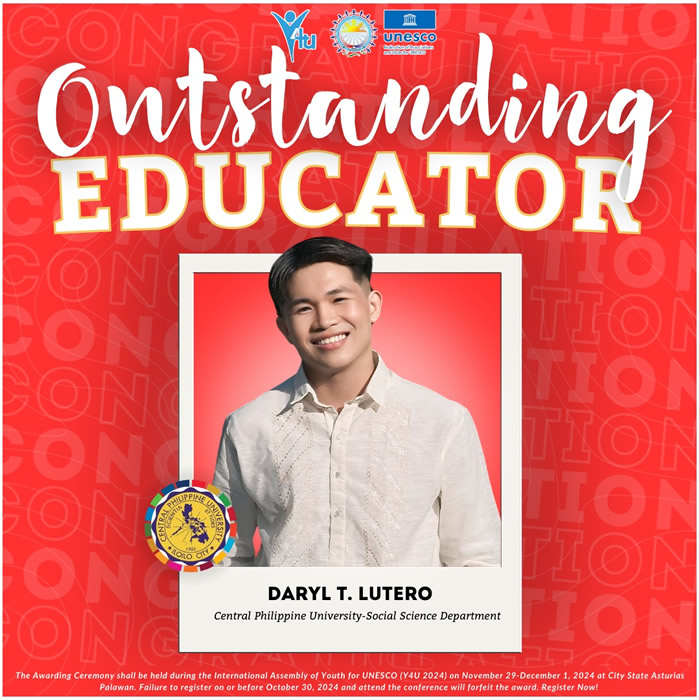By Karren Jay G. Asgar

Mr. Daryl L. Lutero, honored as Outstanding Educator of the Year by the UNESCO Clubs Philippines, exemplifies Centralian pride and leadership in education.
Mr. Daryl L. Lutero, a distinguished faculty member of the Social Sciences Department at Central Philippine University (CPU) College of Arts and Sciences, has recently been named one of UNESCO’s Outstanding Educators of the Year in the College Teaching and Supervision category. This recognition, announced through the official Facebook page of UNESCO Clubs Philippines, highlights Mr. Lutero’s exemplary contributions to the Centralian community and his unwavering commitment to academic excellence.
A Magna cum Laude graduate with a Bachelor of Arts in Political Science and Public Administration, Mr. Daryl L. Lutero is widely recognized for his active engagement in various academic and civic initiatives that began during his college years. His notable accomplishments include being named Former Most Outstanding Senator of Minister for Organizations & Fraternities in the CPU Republic, Former Governor and Board Member of the CPU Province of Arts and Sciences Student Council, and Champion of the 2019 CORE Essay Writing Contest organized by DILG Region 6, Western Visayas. In 2022, he was honored with The Outstanding Students of Iloilo Award (TOSIA), earning the prestigious Artisan Award and recognition for producing the Best Advocacy Video.
In an online interview, Mr. Lutero shared his reflections on receiving the award, saying, “I was awarded by UNESCO Clubs of the Philippines not because I’m an excellent classroom-based educator but by the means of my community involvement to work in advocating sustainable education. As an educator, I became a community worker as I provide lectures on civic education and leadership in various schools and community groups, a peace advocate with Generation Peace Youth Network and, a facilitator in various capacity building programs with Samahan ng Bagong Kabataan and Reform PH. Moreover, as a World Literacy Foundation Ambassador, I advocate for literacy empowerment.”
He reflected on the difficulty of confronting the world’s complex problems, noting that it can be frustrating to deal with issues not only within the government but also among the people themselves. However, he emphasized that these challenges are not a battle to be fought alone. As an outstanding educator and one of many advocates, he believes that achieving sustainable development is a gradual, step-by-step process, requiring collective effort and perseverance.
He began by reflecting on the inherent challenge of being an educator: the realization that the work will not be complete until everyone is learning. This dedication resonates with social realities and can often lead to frustration, prompting questions about the purpose of one’s efforts. Despite these challenges, he found that the problems themselves serve as a powerful motivator. “Although frustrations allow us to question why we are doing these, but in the end, it’s the problem that will always motivate me. It motivates me make padayon (to continue without giving up), not to give solutions but to learn the solutions from the bearers of the problem and be a part of the solution.”
A pivotal realization for him was recognizing that many youths and ordinary citizens lacked basic knowledge of the constitution and their fundamental human rights. He discovered that some students were unaware of the realities and struggles faced by Filipinos outside the classroom. These moments drove him to persist in his efforts, motivating him to continue speaking out, working, and advocating for sustainable development, which he sees as crucial for securing the future. He emphasized the importance of appreciating the present and understanding that current problems are often the result of historical dependencies and a lack of awareness of ongoing realities.
“As the UNESCO Clubs of the Philippines Outstanding Educator, every moment is significant. Every scene, every act, right or wrong, means something and can give spare to the solution. A participant in a lecture or student in a class who’s not listening or sleeping can open an inquiry to answer the why,” he added.
Mr. Lutero stated that the world is evolving, and problems will never be resolved if the solutions are based on past approaches. He emphasized that solutions need to be responsive to current demands and open to outward-looking collaboration. According to him, the goal is not merely to maintain traditions but to foster a culture of sustainability.
“To my beloved Central, my fellow workers of now and the future, I hope that you’re working not only because it’s your job but because you genuinely feel that you are needed to be a part of solution and not to further the problem. The world is evolving, and the problem will never be resolved if the solution we have is intended for the past. It should be responsive to the demands of now and open for outward-looking collaboration. The goal is not only to survive with traditions but to live in a culture of a sustainable society.”
Indeed, Mr. Lutero’s journey is a testament to the profound difference one educator can make, not just in the classroom but in society at large. As the recipient of UNESCO’s Educator of the Year Award, he serves as an inspiration to the Centralian community, reminding us that education is the most powerful tool we have to change the world.
